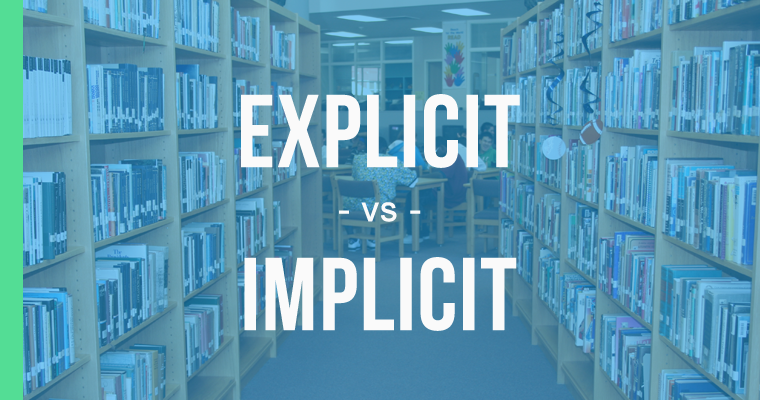Explicit vs. Implicit: What’s the Gist?
Both words are adjectives, but they have near opposite meanings.
- Explicit means something is made clear and stated plainly.
- Implicit means something is implied but not stated directly.
Continue reading for a thorough discussion between these two adjectives.

One of the useful things about descriptors is that English has so many of them. With such a wide variety of options, it is easy to find a word that clearly captures your intended meaning.
The downside to all these options, though, is that some of these words are bound to be quite similar to each other, regardless of what they mean.
The words implicit and explicit, for example, are spelled the same except for the first two letters. Someone unfamiliar with the language might not guess that they actually mean opposite things, and many writers accidentally use one in place of the other.
What is the Difference Between Explicit and Implicit?
In this post, I will carefully compare implicit vs. explicit. I will include example sentences for each of these words, so you can see them in context.
Plus, I will demonstrate the use of a memory tool that can help you choose implicit or explicit next time you need to use one of these words.
How to Use Explicit
Explicit definition: Explicit is an adjective. It means stated plainly or made clear. Something that is explicit has been laid out in no uncertain detail and is easy to understand.
In some cases, explicit is also used to denote vulgar or offensive language.
See the example sentences below,
- The new top 40 hit was an explicit call from the singer to her ex-boyfriend to rekindle their lost love.
- Ashley’s favorite comedy was rated R for explicit language and mature content.
Being an adjective, explicit describes qualities or characteristics of nouns. As with many adjectives, adding -ly to the end of explicit forms the adverb explicitly. Adverbs describe how actions are performed.
How to Use Implicit
Implicit definition: The word implicit is also an adjective. It is related to the verb imply. Implicit means something that is implied or not stated plainly.
Here are a few examples of implicit in a sentence.
- Implicit in Brian’s letter was his unhappiness at having to be away from home for so long.
- The doctor was optimistic, but the implicit meaning of her diagnosis was that Peggy was seriously ill and might not have much longer to live.
Like explicit, implicit can form an adverb with the suffix -ly. In this case, the adverb is implicitly.
Outside Examples of Explicit vs. Implicit
- She didn’t “leak,” she only “unmasked.” This is former National Security Adviser Susan Rice’s self-defense for having sought the explicit exposure, in highly classified intelligence documents, of the names of US citizens inadvertently caught up in American surveillance of Russian officials. –New York Post
- That’s a number that adds in implicit liabilities that are not easily captured in official reports about the public debt. It also looks over a very long time period — 75 years. –The Washington Post
How to Remember These Words
These two words are confusing because they are so similar. In reality, though, they are literally opposites.
- When something is implicit, it is implied, rather than stated clearly.
- In contrast, something that is explicit has been stated clearly.
Thus, something implicit has been implied, while something that is explicit has been explained. Since implicit begins with the same letters as implied, and explicit begins with the same letters as explained, remembering which of these words is which should be simple.
Article Summary
Is explicit or implicit correct? Implicit and explicit are adjectives that appear similar but actually have opposite meanings.
- Explicit means stated clearly or made clear.
- Explicit is also used to refer to language that is offensive or vulgar.
Implicit means implied, but not stated clearly.
